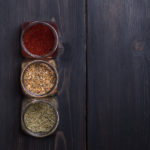By Bonnie Jenkins, Advanced Natural Wellness
In 1971, President Richard Nixon declared that the “war on cancer” was being won. That statement may have had some truth to it, but the reality is that the battle against cancer has moved at a tragically slow pace over the past 40 years. But the good news is that researchers are discovering that ordinary Americans like you and I can easily arm themselves against this devastating disease with simple lifestyle changes.
Of course, it’s no secret that smoking is one of the biggest contributors to cancer. In fact, about a third of all cancer deaths in the U.S. can be blamed on cigarettes. Another third is suspected to be triggered by family history and environmental factors. But here’s the kicker—scientists now blame what you eat for the remaining third of all cancers!
What are the most dangerous foods in our diet?
MD Exposes the Hidden Danger to Your Eyes

When your eyesight starts to fail, it's a real problem. Suddenly you can't go to the grocery store... you can't get to the doctor if you have an emergency... you can't meet your friends for dinner…
Your "regular" doctor doesn't have time to keep up with the latest research. And the same goes for eye doctors. They go to school to learn how to fit you for glasses and contacts, but have no way of preventing the damage and loss of eyesight that threatens your freedom and independence.
Let me show you something that explains a LOT about how your eyes work.
In my FREE Special Report, I'll show you a HUGE, untapped resource for your eyes that safely and naturally restores clear, effortless eyesight.
Click here to get started...
- Refined sugar tops the list. Cancer tumors develop, in part, by feeding on sugar in the bloodstream. If you eat lots of sugary snacks loaded with simple carbs, you’re loading your bloodstream with the chemical energy needed for cancer cells (and tumors) to proliferate.
- Hydrogenated and partially hydrogenated oils create trans fats. Research in the American Journal of Epidemiology has linked these phony fats to pre-cancerous colon polyps—boosting colorectal cancer-risk.
- Acrylamides are chemicals that are created during the process of cooking foods at high temperature. A Swedish study found that acrylamides cause cancer in rats and more studies are under way to confirm that they can do the same in humans.
- Sodium nitrates are proven carcinogens that are deliberately added to processed meats to help them look “fresh.” But nitrites themselves aren’t the problem. During the digestion process, sodium nitrite is converted to nitrosamine, and that’s where the cancer problems begin. Nitrosamines are also found in food items that are pickled, fried or smoked, and in things like beer, cheese, fish byproducts and tobacco smoke.
Luckily, there are other foods that can actually prevent cancer cells from forming. The most well known are fresh fruits and vegetables. Packed with powerful antioxidants, studies have shown that certain fruits and vegetables can protect against specific types of cancer. For instance, the lycopene in tomatoes may prevent prostate cancer as well as pancreatic cancer in men. A diet high in cruciferous vegetables like broccoli,
Brussels sprouts and cauliflower benefits people with a genetic predisposition to lung cancer. Some studies also suggest that berries and red grapes may have cancer-
preventive properties.
Three recent studies have added even more evidence that, when it comes to cancer, food can be the best medicine. Researchers in Milan, Italy found that both onions and garlic help reduce the risk for colorectal, ovarian, prostate, breast, renal, esophageal, oral and throat cancer. Another study at the Karolinska Institute in Sweden showed that eating lots of leafy greens and other carotenoid–rich foods can slash the risk of stomach cancer in half. These same foods may also reduce the odds of developing non-Hodgkin lymphoma.
The World's Quickest Solution for Ending Prostate and Urinary Misery
This has recently been revealed to be one of the only real breakthroughs in prostate health.
The seeds of a strange fruit (sometimes called "Chinese Apples") hold powerful phytonutrients that are a revolution in prostate health.
In fact, UCLA and Veterans Administration research have now proved this to be true.
Not only that, but it may be the worlds quickest solution for ending prostate misery.
Simply stated, these phytonutrients represent a huge step beyond beta sitosterol, saw palmetto, and other phytosterols alone.
Simply click HERE if you want to have fast prostate relief...restful, uninterrupted sleep...no more constant "urges to go"...enhanced virility...and optimal prostate support for life.
Adding tea to your anti-cancer arsenal is also smart. A recent US Department of Agriculture study found that certain compounds in both green and black teas kill human cancer cells. Specifically, these compounds—collectively known as polyphenols—were found to decrease the number of breast, colon, prostate and liver cancer cells. While most research is based on drinking four to 10 cups of tea daily, you can also take a green tea supplement to achieve similar protection.
Supplements can fill in nutritional gaps when you can’t always eat right. The two most important are calcium and fish oil. Findings from the Shanghai Women’s Health Study show that the participants with the highest daily calcium intake had a 40 percent lower risk of colorectal cancer than those with the lowest calcium intake. The recommended amount of calcium you should be getting each day from supplements is 1,200 mg., taken in a divided dose. And then there’s fish. Harvard scientists found that men who ate fish at least five times a week had a 40 percent lower risk of colorectal cancer compared to those eating the least fish. But you don’t need a constant diet of fish. People taking at least 2,000 mg. of supplemental fish oil daily saw the same benefit.
While the study of cancer-fighting foods is still in its infancy, it looks like a practical and delicious way to keep cancer at bay. As an added bonus, these are also the very same foods that promote a healthy heart and prevent weight gain. Bon apetite!
References:
Giovannucci E. Nutritional predictors of insulin-like growth factor I and their relationships to cancer in men. Cancer Epidemiology, Biomarkers and Prevention. 2003;12:84-89.
Lam TK. Cruciferous vegetable consumption and lung cancer risk: a systematic review. Cancer Epidemiology, Biomarkers and Prevention. 2009;18:184-195.
Shin A. Dietary intake of calcium, fiber and other micronutrients in relation to colorectal cancer risk: Results from the Shanghai Women’s Health Study. International Journal of Cancer. 2006;119:2938-2942.





